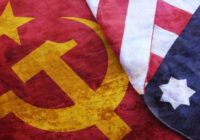The North Korean crisis can only be resolved if Donald Trump understands Kim Jong-un’s ideological perspective.
Donald Trump’s increasingly incendiary statements and tweets and Kim Jong-un’s threats to launch missiles at or near the American Pacific island of Guam have sparked possibly the most dangerous nuclear standoff since the Cuban Missile Crisis. The “Thirteen Days” in October 1962 undoubtedly marked the closest mankind has come to annihilation with the two Cold War superpowers — with their vast nuclear arsenals — facing each other eyeball-to-eyeball.
Yet John F. Kennedy and Nikita Khrushchev had something that Trump and Kim appear to lack: a good understanding of each other. In 1961, the two men had met in Vienna and soon after had overcome a major crisis over Berlin. Consequently, when it came to the Cuban Missile Crisis, although relations were far from close, they both seemed reasonably confident that their adversary did not want a nuclear war. Deescalation thus proved achievable with both sides communicating behind the scenes and making no rash public statements. What’s more, the two leaders took no drastic actions and were willing to make essential face-saving concessions.
However, since January 2017, the crisis has been characterized by anything but caution. North Korea’s announcement that it has made great strides in producing inter-continental ballistic missiles (ICBM) and nuclear warheads small enough for these weapons has been met with American military posturing and dire warnings by Trump. Evidently, then, little understanding exists between the US president and the latest ruler of the Kim dynasty. The conduct of both leaders demonstrates that neither man is willing to leave open room for concessions necessary to lessen tensions on the peninsula.
The New Kim
Kim Jong-un swiftly and somewhat unexpectedly assumed the role of the supreme leader following the death of his father, Kim Jong-il, in December 2011. Initially, some indications emerged that he might adopt a less confrontational foreign policy. Yet these hopes soon evaporated as he resumed his father’s obsession with nuclear weapons. He has thus felt emboldened to make much more provocative threats than his predecessors since he possesses something they did not: weapons that can be used directly against US territory.
Yet, despite the inherent problems in trying to understand Kim’s mentality, it seems he is baffled by Trump’s mixed signals. Trump, true to his word, is taking a very different approach to at least the last four American presidents. He is combining the tried-and-tested policy of sanctions and negotiations with unveiled threats in much the same language as Pyongyang. Kim has thus failed to understand that Trump represents a very different kind of president. Even more worrying, nevertheless, is the fact that the Trump administration appears to have little comprehension of Kim’s ideological mind-set. Stemming from the Korean words ju — master or ruler, and che — body or entity, Juche is usually translated as “self-reliance.” Yet this phrase does not truly reflect the essence of this unique conceptual framework. First propagated in 1953 after Joseph Stalin’s death and the end of the Korean War, Kim Il-sung — Kim Jong-un’s grandfather – realized the need to reduce Soviet influence over North Korea.
Still, it was a decade later that Kim Il-sung, following a series of purges securing his undisputed leadership of the country, that Juche was formally launched. This uniquely North Korean brand of nationalism initially appeared to be something akin to what many of the nonaligned countries supported at the time. But it quickly became clear that Juche was designed to both secure the country from American “imperialism” and prevent interference from both the USSR and China. To achieve this goal, North Korea was placed on a constant war footing, and its entire economy was geared toward the creation of a militarized state ready to defend itself or take offensive action if necessary.
More importantly, Juche’s cardinal message was that security and independence could only be achieved by establishing the absolute obedience of the population to its leader. Juche asserts that the leader is the brain of the socio-political organism and whatever he says or does is unquestionably correct. Kim Il-sung and his successors, building on Korean Confucian traditions of reverence for the leader and “father,” have thus created a cult of personality far surpassing that of any other totalitarian leader, effectively deifying themselves. The myths created around the Great Leader (Kim Il-sung) and the Dear Leader (Kim Jong-il) are often ridiculed outside of North Korea. Yet it must be stressed how deep their ideological roots are buried within the hermit state. The tenets of Juche permeate all aspects of Korean culture and society and it is no surprise that the 170-meter Juche Tower dominates the Pyongyang skyline.
Existential Threat
So why does Trump need to understand Juche in the current crisis? To begin with, Trump’s words and actions all suggest that he views Pyongyang as being a rational and pragmatic actor that will inevitably cower before American might. He is neglecting the fact that North Korea is not a tin-pot dictatorship with a tyrant acting purely on a whim. The Juche mentality instilled in Kim Jong-un since birth has presented the United States as the ultimate existential threat to North Korea. As a result, it is almost impossible for him not to respond to aggressive rhetoric in kind. To do so would be to suggest weakness and vacillation and undermine his divine leadership credentials. Trump must then consider how Kim can be given space to make concessions on a quid-pro-quo basis rather than expecting him to back down unilaterally. Moreover, Juche is compounded by East Asian cultural norms regarding saving face. If Kim sees no other way out of this crisis, he might just launch a missile toward Guam.
In addition, Trump seems to be neglecting the end results of half a century of Juche. Undoubtedly the USA — with a military budget almost three times that of China — does have the capability to wreak “fire and fury” down upon the small North Korean state. Nonetheless, North Korea, even without its fledgling nuclear arsenal, does have the capability to inflict massive damage upon its southern neighbor as well as Japan, its traditional bête noir. Juche may have drastically failed the vast majority of the North Korean population who live in abject poverty. But it has produced a military machine far exceeding the size of the nation and a society prepared to fight to the bitter death. Trump should not assume, therefore, that military action can be feasibly taken against North Korea without any risk of repercussions.
Finally, Trump’s repeated calls for China to exercise its mediatory influence over North Korea demonstrate that he has misunderstood the role of Juche in relations between Beijing and Pyongyang. The North Korean economy would likely collapse completely without assistance from China and the ability to sell goods — mainly raw materials such as coal — in the Chinese market. It is also true that some lingering sense of ideological solidarity as well as memories of fighting side-by-side during the Korean War do remain. Yet Juche was always designed to maintain North Korea’s independence of action and for the Kim dynasty to control its own fate. China largely respects this fact and so rarely attempts to coerce its neighbor. Beijing may seek to act as a mediator in this crisis but it is difficult to envisage President Xi Jinping to do much more as Trump has demanded.
In sum, while the chances of the crisis over Korea leading to nuclear war remain distant, the situation will continue to intensify while both leaders adopt inflammatory rhetoric. Kim Jong-un must come to understand that Trump is very unlikely to negotiate while US territory is being directly threatened. Yet in this situation, the president of the United States — the most powerful nation in the world — must be the one to demonstrate true statesmanship. This can only be achieved if Trump recognizes the ideologically-driven nature of the Kim dynasty and drops his threats to wipe North Korea off the face of the Earth. Only then can mediatory attempts successfully find the concessions necessary to deescalate the crisis.
The views expressed in this article are the author’s own and do not necessarily reflect Fair Observer’s editorial policy.
Photo Credit: Astrelok / Shutterstock.com
Support Fair Observer
We rely on your support for our independence, diversity and quality.
For more than 10 years, Fair Observer has been free, fair and independent. No billionaire owns us, no advertisers control us. We are a reader-supported nonprofit. Unlike many other publications, we keep our content free for readers regardless of where they live or whether they can afford to pay. We have no paywalls and no ads.
In the post-truth era of fake news, echo chambers and filter bubbles, we publish a plurality of perspectives from around the world. Anyone can publish with us, but everyone goes through a rigorous editorial process. So, you get fact-checked, well-reasoned content instead of noise.
We publish 2,500+ voices from 90+ countries. We also conduct education and training programs
on subjects ranging from digital media and journalism to writing and critical thinking. This
doesn’t come cheap. Servers, editors, trainers and web developers cost
money.
Please consider supporting us on a regular basis as a recurring donor or a
sustaining member.
Will you support FO’s journalism?
We rely on your support for our independence, diversity and quality.







